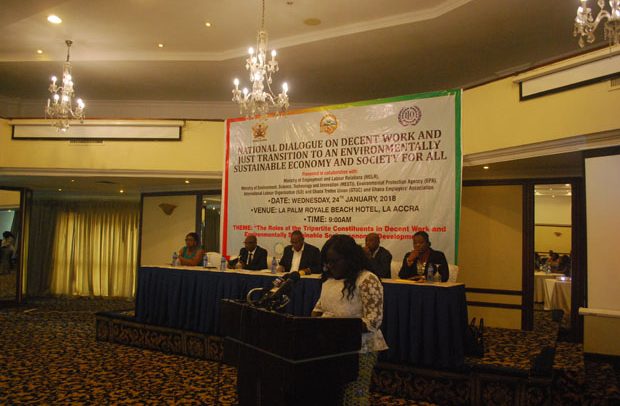The Deputy Minister Delivering Her Speech
The Ministries of Employment and Labour Relations (MELR) and Environment, Science, Technology and Innovations (MESTI), in collaboration with the International Labour Organization (ILO), have held a national dialogue on Decent and Just Transition to an Environmentally Sustainable Economy and Society for All, a resolution adopted at the ILO’s 102nd session in 2013.
The national dialogue, which was attended by representatives of the Trades Union Congress (TUC), Ghana Employers Association (GEA), was held under the theme, ‘The Role of Tripartite Constituents in Decent Work and Sustainable Development’ at the La Palm Royal Beach Hotel, Accra yesterday.
Bright Wireko-Brobby, Deputy Minister for Employment and Labour Relations, who opened the workshop said, “Just Transition is a conceptual framework in which the labour movement captures the complexities of the transition towards a low-carbon and climate resilient economy.”
According to him, “It also highlights public policy needs aiming at maximizing benefits and minimizing hardships for workers and their communities in this transformation which addresses the different aspects of the national economy.”
The minister, who is also the Member of Parliament (MP) for Hemang, Lower Denkyira in the Central Region, indicated that the national dialogue would help Ghana and its partner states to “unpack the key issues related to vulnerabilities of the labour market.”
“Some of the issues are the uncertainties regarding job impacts, risk of job losses, and risk of undemocratic decision, among others.”
Dr Akua Ofori-Asumadu of the ILO Ghana Office indicated that the ‘Decent Work and Just Transition to an Environmentally Sustainable Economy and Society For All’ was a resolution adopted at the ILO’s 102nd session in 2013.
She said that the ILO Governing Body in June 2014 endorsed the proposal to hold a tripartite meeting of experts in 2015 to review, amend and adopt draft guidelines based on country policies and sectoral strategies towards environmental sustainability, greening of enterprises, social inclusion and the promotion of green jobs.
According to her, the work of the committee is based on four pillars of decent work agenda, which are social dialogue, social protection, rights at work and employment.
She indicated that the guidelines are meant to provide a non-binding practical orientation to governments and social partners with some specific options on how to formulate, implement and monitor the policy framework in accordance with national circumstances and priorities.
By Solomon Ofori


